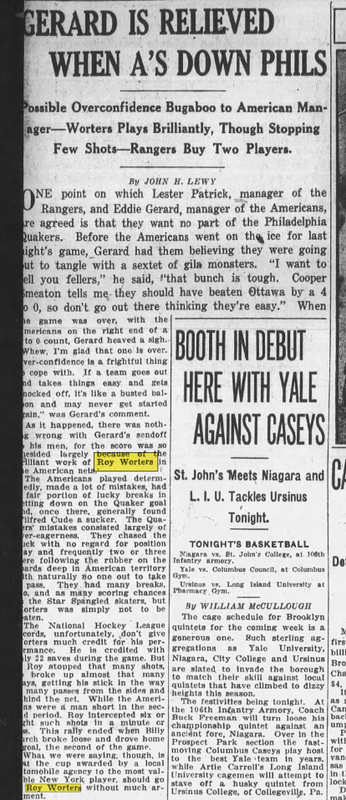mrhockey193195
Registered User
Super interesting post. Is it a reasonable theory to say that the proliferation of more advanced stats in the 2000s (starting simply with more emphasis being put on vanilla SV%, but evolving to where we are today with much better tools to quantify goalie performance) is a big factor?1.98
One of my holdups is that Vezina shares aren't equal across generations. It has become considerably harder to put together a Vezina record. I'm not exactly sure why, but voters are more likely to give Vezina votes to "one-offs" compared to years past.
Vezina shares by birth decade, all results over 0.50
1960s
[TABLE=collapse]
[TR]
[TD]Rank[/TD]
[TD]Name[/TD]
[TD]Birth Year[/TD]
[TD]Vezina Shares[/TD]
[/TR]
[TR]
[TD]1[/TD]
[TD]Dominik Hasek[/TD]
[TD]1965[/TD]
[TD]4.76[/TD]
[/TR]
[TR]
[TD]2[/TD]
[TD]Patrick Roy[/TD]
[TD]1965[/TD]
[TD]4.63[/TD]
[/TR]
[TR]
[TD]3[/TD]
[TD]Ed Belfour[/TD]
[TD]1965[/TD]
[TD]2.51[/TD]
[/TR]
[TR]
[TD]4[/TD]
[TD]Tom Barasso[/TD]
[TD]1965[/TD]
[TD]1.98[/TD]
[/TR]
[TR]
[TD]5[/TD]
[TD]Curtis Joseph[/TD]
[TD]1967[/TD]
[TD]1.02[/TD]
[/TR]
[TR]
[TD]6[/TD]
[TD]Ron Hextall[/TD]
[TD]1964[/TD]
[TD]0.86[/TD]
[/TR]
[TR]
[TD]7[/TD]
[TD]Mike Vernon[/TD]
[TD]1963[/TD]
[TD]0.84[/TD]
[/TR]
[TR]
[TD]8[/TD]
[TD]Darren Puppa[/TD]
[TD]1965[/TD]
[TD]0.82[/TD]
[/TR]
[TR]
[TD]9[/TD]
[TD]Kirk McLean[/TD]
[TD]1966[/TD]
[TD]0.75[/TD]
[/TR]
[TR]
[TD]10[/TD]
[TD]Andy Moog[/TD]
[TD]1960[/TD]
[TD]0.56[/TD]
[/TR]
[TR]
[TD]Sum[/TD]
[TD][/TD]
[TD][/TD]
[TD]18.73[/TD]
[/TR]
[TR]
[TD]Sum without Hasek/Roy[/TD]
[TD][/TD]
[TD][/TD]
[TD]9.34[/TD]
[/TR]
[/TABLE]
1970s
[TABLE=collapse]
[TR]
[TD]Rank[/TD]
[TD]Name[/TD]
[TD]Birth Year[/TD]
[TD]Vezina Shares[/TD]
[/TR]
[TR]
[TD]1[/TD]
[TD]Martin Brodeur[/TD]
[TD]1972[/TD]
[TD]5.40[/TD]
[/TR]
[TR]
[TD]2[/TD]
[TD]Roberto Luongo[/TD]
[TD]1979[/TD]
[TD]1.66[/TD]
[/TR]
[TR]
[TD]3[/TD]
[TD]Tim Thomas[/TD]
[TD]1974[/TD]
[TD]1.55[/TD]
[/TR]
[TR]
[TD]4[/TD]
[TD]Miikka Kiprusoff[/TD]
[TD]1976[/TD]
[TD]1.44[/TD]
[/TR]
[TR]
[TD]5[/TD]
[TD]Evgeni Nabokov[/TD]
[TD]1975[/TD]
[TD]1.23[/TD]
[/TR]
[TR]
[TD]6[/TD]
[TD]Olaf Kozlig[/TD]
[TD]1970[/TD]
[TD]0.84[/TD]
[/TR]
[TR]
[TD]7[/TD]
[TD]Marty Turco[/TD]
[TD]1975[/TD]
[TD]0.72[/TD]
[/TR]
[TR]
[TD]8[/TD]
[TD]Jose Theodore[/TD]
[TD]1976[/TD]
[TD]0.70[/TD]
[/TR]
[TR]
[TD]9[/TD]
[TD]Roman Turek[/TD]
[TD]1970[/TD]
[TD]0.56[/TD]
[/TR]
[TR]
[TD]10[/TD]
[TD]Jim Carey[/TD]
[TD]1974[/TD]
[TD]0.52[/TD]
[/TR]
[TR]
[TD]Sum[/TD]
[TD][/TD]
[TD][/TD]
[TD]14.62[/TD]
[/TR]
[TR]
[TD]Sum without Brodeur[/TD]
[TD][/TD]
[TD][/TD]
[TD]9.22[/TD]
[/TR]
[/TABLE]
1980s
[TABLE=collapse]
[TR]
[TD]Rank[/TD]
[TD]Name[/TD]
[TD]Birth Year[/TD]
[TD]Vezina Shares[/TD]
[/TR]
[TR]
[TD]1[/TD]
[TD]Pekka Rinne[/TD]
[TD]1982[/TD]
[TD]2.12[/TD]
[/TR]
[TR]
[TD]2[/TD]
[TD]Sergei Bobrovsky[/TD]
[TD]1988[/TD]
[TD]1.97[/TD]
[/TR]
[TR]
[TD]3[/TD]
[TD]Henrik Lundqvist[/TD]
[TD]1982[/TD]
[TD]1.93[/TD]
[/TR]
[TR]
[TD]4[/TD]
[TD]Braden Holtby[/TD]
[TD]1989[/TD]
[TD]1.68[/TD]
[/TR]
[TR]
[TD]5[/TD]
[TD]Tuukka Rask[/TD]
[TD]1987[/TD]
[TD]1.50[/TD]
[/TR]
[TR]
[TD]6[/TD]
[TD]Carey Price[/TD]
[TD]1987[/TD]
[TD]1.40[/TD]
[/TR]
[TR]
[TD]7[/TD]
[TD]Ryan Miller[/TD]
[TD]1980[/TD]
[TD]0.87[/TD]
[/TR]
[TR]
[TD]8[/TD]
[TD]Jonathan Quick[/TD]
[TD]1986[/TD]
[TD]0.75[/TD]
[/TR]
[TR]
[TD]9[/TD]
[TD]Semeyon Varlamov[/TD]
[TD]1988[/TD]
[TD]0.60[/TD]
[/TR]
[TR]
[TD]10[/TD]
[TD]Ilya Bryzgalov[/TD]
[TD]1980[/TD]
[TD]0.59[/TD]
[/TR]
[TR]
[TD]Sum[/TD]
[TD][/TD]
[TD][/TD]
[TD]13.41[/TD]
[/TR]
[/TABLE]
1990s
[TABLE=collapse]
[TR]
[TD]Rank[/TD]
[TD]Name[/TD]
[TD]Birth Year[/TD]
[TD]Vezina Shares[/TD]
[/TR]
[TR]
[TD]1[/TD]
[TD]Connor Hellebucyk[/TD]
[TD]1993[/TD]
[TD]2.63[/TD]
[/TR]
[TR]
[TD]2[/TD]
[TD]Andrei Vasilevsky[/TD]
[TD]1994[/TD]
[TD]2.05[/TD]
[/TR]
[TR]
[TD]3[/TD]
[TD]Igor Shesterkin[/TD]
[TD]1995[/TD]
[TD]1.02[/TD]
[/TR]
[TR]
[TD]4[/TD]
[TD]Linus Ullmark[/TD]
[TD]1993[/TD]
[TD]0.87[/TD]
[/TR]
[TR]
[TD]5[/TD]
[TD]Ilya Sorokin[/TD]
[TD]1995[/TD]
[TD]0.54[/TD]
[/TR]
[TR]
[TD]Sum[/TD]
[TD][/TD]
[TD][/TD]
[TD]7.11[/TD]
[/TR]
[/TABLE]
The net result is that from 1960s era births through 1990s era births it has become systematically harder to consolidate Vezina votes. More goalies get votes, more goalies get throw away votes.
Barasso is a great example. He has the fourth highest Vezina share of goalies born in the 60s (Hasek, Roy, Belfour). Yet, only four goalies born 1965 have achieved a higher Vezina share than he did (Brodeur, Hellebucyk, Rinne, Vasilevskiy).
Maybe the 60s born goalies were just stacked to an unreal level. But it doesn't sit right with me that the fourth best goalie born in the 1960s would be ahead all but four goalies born 1966-1995.
I'm sure you could throw this into excel and make a relationship with Vezina vote consolidation, but I'm at a loss as to how to do it.
Obviously 1990s era goalies are still getting votes so it's incomplete.
I'm not saying we should be throwing out Vezina shares, but I think the changes in voting patterns makes direct era-comparisons particularly challenging.
Previously, Wins and GAA were heavily weighted, and the result are high Vezina finishes that are largely supported by playing on a good team and reputation which in hindsight look a bit off (e.g., Belfour finishing 2nd in 95, Fuhr winning in 88, etc.).
EDIT: The other factor that I believe plays a bit part is that with technique and equipment becoming more or less homogenized, the variance in goaltending today is less than it has even been. It's very hard for the best goalies to stand out from league average, and it's much easier for a league average goalie having a career year to be towards the top of the Vezina voting.







